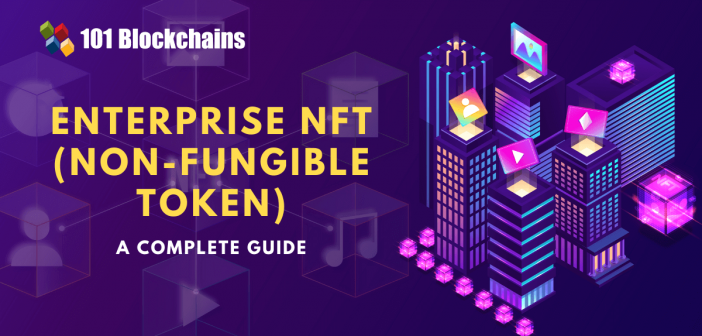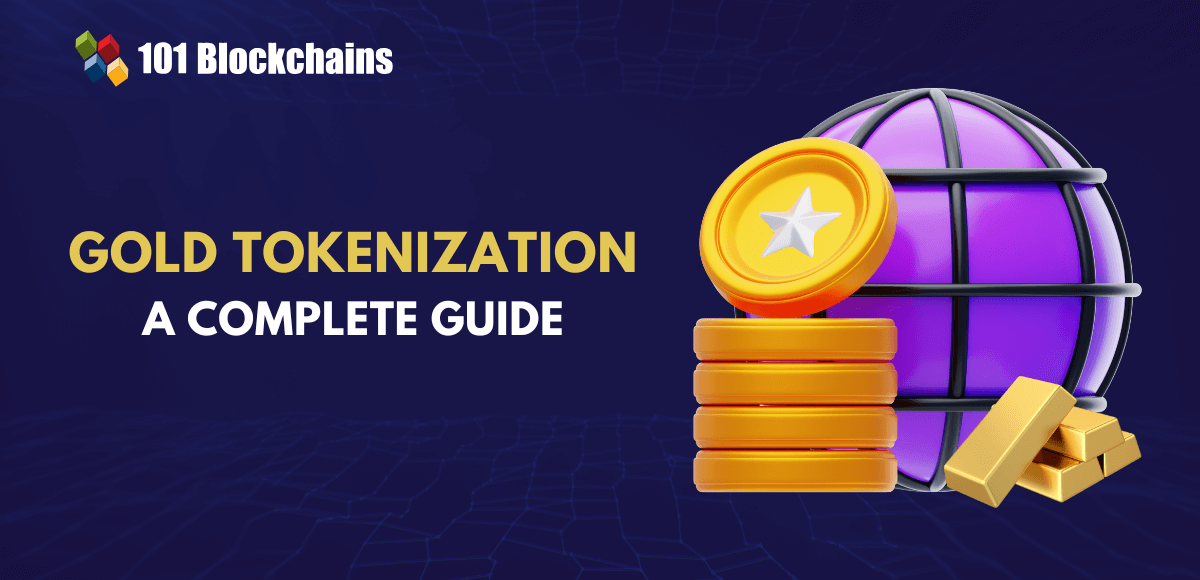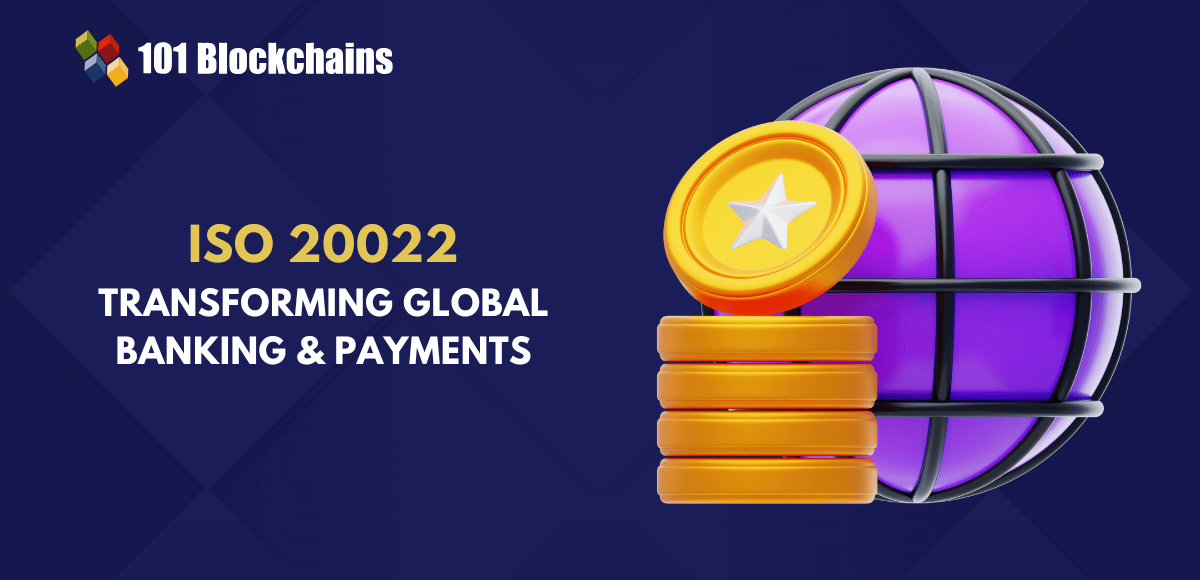Learn how blockchain truly works, master key definitions, and uncover what makes smart contracts so "smart." Dive into the fundamentals, gain valuable insights, and start your blockchain journey today!

- Guides
Diego Geroni
- on September 20, 2021
A Comprehensive Guide on Enterprise NFT (Non-Fungible Token)
What is all this buzz about enterprise NFT around? If you’re wondering what is enterprise NFT, you’ve reached the right place. Let’s dive in to explore this enterprise non-fungible token guide!
The “revolutionary” identity of blockchain technology is one of the foremost factors for which it draws a lot of attention. It offers an effective approach for the community to reach a consensus regarding the state of its ledger. Therefore, the mass adoption of blockchain depends considerably on identifying entities, processes, or systems which generally require high costs for reaching consensus in the real world. By mapping the entities, processes, and systems to the blockchain for creating new values, you can achieve consensus easily. So, what is all the talk about Enterprise NFT in blockchain circles recently? Does it have anything to do with mass adoption of blockchain? Or is it just another offshoot of the recently exploding NFT phenomena? Let us find out answers to these doubts in the following enterprise NFT guide.
What is Enterprise NFT?
Even after years of introduction, blockchain is still a confusing choice for enterprises. In addition, the arrival of NFTs or non-fungible tokens could further escalate the confusion regarding blockchain use cases. Is Enterprise non-fungible token the answer to these problems? The world has witnessed a prolific growth in public awareness regarding blockchain technology with the growth of cryptocurrency markets all over the world. The efforts and vision for blockchain technology and the contribution of industry pioneers have helped blockchain gain mainstream recognition.
Apart from cryptocurrencies, NFTs have emerged as one of the formidable use cases of blockchain technology in recent times. Most important of all, the mainstream adoption of non-fungible tokens garnered highlights with digital artwork sales fetching almost $70 million. In addition, NFTs are also becoming favorites of artists, producers, celebrities and content creators all over the world. While NFTs have formidable potential in the field of art, collectibles, and culture, they are capable of more. This is where you can find your answers to ‘What is Enterprise NFT?’ with a simple explanation.
NFTs have the capability of inducing a positive influence on all aspects of the daily lives of people. At the same time, NFTs also have the potential for unlocking massive and sustainable value for enterprises and businesses. Such capabilities of NFTs present the possibilities for leveraging them in enterprise blockchain.
Want to get an in-depth understanding of non-fungible tokens (NFTs)? Enroll now in NFT fundamentals course.
Strength for Enterprise NFT
The growth of enterprise NFT use cases depends profoundly on the NFT traits which encourage mass adoption. Non-fungible tokens or NFTs point out to the class of digital assets on the blockchain, which serve as representatives of the ownership of real-world assets. The technological foundation of NFT ensures the uniqueness of every NFT alongside limitations on exchangeability with other NFTs. The design of NFTs ensures that the community should achieve consensus regarding the issuer and owner alongside NFT transfer history.
The interesting fact about NFTs is that the object of ownership is not limited to digital assets only. You can also have physical assets as objects of ownership. However, it is also important to note that the object of ownership could also include intangible privileges or rights in the real world. So, it is clearly evident that enterprise NFT definitely has the potential for affecting different aspects of our daily life. Now, the question arises about how NFTs can affect our daily lives.
-
Tradable Assets
The foremost impact of NFT in creating value comes from their identity as a selection of assets with improved tradability. Decentralized marketplaces have played a crucial role in establishing the foundation for enterprise NFT platforms serving effective value in accessibility and liquidity for underlying assets and privileges related to NFTs.
-
Product Design and User Engagement
Non-fungible tokens are also responsible for inducing fundamental changes in the approaches for product design and user engagement. For example, some artists could choose to release their artwork as electronic NFTs with the flexibility for specifying profit-sharing rules. On the other hand, enterprise NFT use cases are also helpful for designing a collection of physical products and NFTs or NFT-based digital products for encouraging user engagement. As a result, enterprises could create new values for users through NFT trading, thereby enabling improvements in sales.
The development of goods with NFTs is presently one of the formidable use cases of enterprise non-fungible token presently. Enterprise NFTs could also offer functionalities of better traceability and anti-counterfeiting measures. In addition, some other examples of use cases of enterprise NFTs involve the use of eNFTs for user engagement and identification on their social platforms. Luxury fashion brands could link eNFTs to leather products and bags for serving as an ideal authentication tool to enable anti-counterfeiting. An electronic NFT ecosystem could enable linking all eNFTs together thereby opening doors for decentralized engagement and trading with a common marketplace.
With endless use cases of eNFTs, it is reasonable to note that they are more than just a topic of academic concern. As a result, you can notice practical implementations of enterprise NFTs or strategies for implementing the same in the future.
Learn the concept, elements, future and use cases of NFTs from Non Fungible Tokens (NFTS) Ebook
Factors Needed for Enterprise NFTs
The growth of enterprise NFTs depends profoundly on their ability to transform industries other than collectibles, art, and media. Basically, enterprise NFT opens up the road to mass adoption of NFTs. However, you must note the important factors that can support mass adoption or induce sustainability in the whole NFT value chain. Here are the important factors which can establish the foundation required for enterprise NFTs.
- The object associated with an NFT should have adequate value to ensure that the value generated in the value chain would be more than the associated costs.
- The ownership of an NFT must be enforceable as the NFT itself would not map the ownership on some digital assets. Any individual capable of affording the cost of using blockchain could create NFTs for claiming specific ownership. The enforcement of claimed ownership ensures that the NFT is more than just a fancy item on the blockchain network.
- Another crucial aspect required for growing the adoption of enterprise non-fungible tokens refers to the requirement for fully facilitating NFT trading. It is important to note that trading helps in generating considerable value from NFT. Therefore, it is important to ensure that the blockchain associated with NFT offers considerable scalability, security, accessibility, and affordability benefits.
- In addition, an enterprise NFT guide also emphasizes the need for services like DeFi, marketplaces, and stablecoins. These services could boost the prospects for ensuring NFT trading in an eNFT ecosystem with improve efficiency.
Start learning Non-Fungible Token with World’s first NFT Skill Path with quality resources tailored by industry experts Now!
Enterprise NFTs and the Road to Mass Adoption of NFTs
Enterprises would have a major role in driving the growth of NFT mass adoption. So, how could enterprises achieve this? Here are some of the important reasons which show how enterprises would lead the mass adoption of NFTs in the future.
-
Better Quality NFTs
The quality of NFTs has a massive role in promoting the adoption of enterprise NFT use cases. As a matter of fact, the quality of NFTs is highly crucial for ecosystem sustainability. Enterprises are likely to have a better focus and clear objectives when they design and develop NFTs. In addition, enterprises would also invest efforts in the development or enhancement of facilities for improving the user experience. As a result, the arrival of enterprise NFTs could definitely offer prolific assurance regarding NFT quality.
-
New Users
Enterprises could also drive new users to the NFT ecosystem. After issuing enterprise NFTs on the blockchain with an adequate scope of tradability on marketplaces, eNFT owners would become a part of the ecosystem. Furthermore, close followers of eNFTs could also become invaluable additions to the eNFT ecosystem.
-
Ownership Enforcement
Enterprise non-fungible token use cases also emphasize on the role of enterprises as natural ownership enforcers. Enterprises have liabilities for delivering products to customers as promised. Therefore, enterprises are more likely to have the motivation for verifying enforcement of ownership associated with an issued NFT, either in part of the product or as the whole. Any discrepancies in fulfilling the enforcement could impose a considerably negative influence on the company’s reputation. So, it is less likely that an enterprise would risk its reputation and lose customers as well as its profits.
Get familiar with the basic and advanced Non-Fungible Token (NFT) terms with the NFT Flashcard
Practical Use Cases of Enterprise NFTs
The enterprise NFT use cases could provide a detailed impression of how they can succeed. Generally, the only difference between blockchain and NFT is the multi-parity vs. single-parity applications. Multi-parity applications, like in blockchain, emphasized premature new blockchain decisions taken by diverse committees with barely aligning interests. On the other hand, NFTs could offer the value of direct effort-benefit. As a result, NFTs could open up the road for faster value benefits for small groups, individuals, and mission-centric homogenous organizations. Here are some examples of practical applications of enterprise NFT.
-
Workflows
The example of ServiceNow shows the effective use of eNFTs. It can help in tracking the progress of regulated internal business processes in accordance to internally and externally developed tickets. Apart from SaaS, NFTs could ensure automatic audit trails to facilitate GDPR/CCPA compliance for the activity of any user or app.
Here’s a guide to fungible vs. non-fungible tokens that focuses on their differences. Check now!
-
Cyber Security
Enterprise NFTs could also establish the foundation for enhancing the integrity aspect related to the CIA triad. For example, the recently automated Integrity could match up with the specified cloud & big data automation levels of related information security availability and confidentiality. Enterprise NFT applications could ensure that adequate support for encryption, making it more resilient towards newly emerging attacks.
-
Documents and Forms
Enterprise NFTs also show promising implications for efficient and automatic registration of documents and forms as legal documents. The example of Salesforce provides a guiding light in this case. You can notice how every purchase order in Salesforce can be registered as a legal document automatically and efficiently. Therefore, you could use an enterprise NFT platform for streamlining invoices, BOMs, and prescriptions among other digital documentation.
-
Social Media Feeds and Marketing Analytics
The massive variations in social media feed create a lot of confusion for marketing analytics. Data pipelines do not have any specific lineage or provenance in the present times. The continuously increasing confusion in delivering social media messages is definitely a prominent concern. Therefore, eNFTs can address this problem by offering a distinct proof of ownership of data pipelines. Enterprises could easily demarcate the data related to them and their operations for making better decisions.
Build your identity as a certified blockchain expert with 101 Blockchains’ Blockchain Certifications designed to provide enhanced career prospects.
Best Enterprise NFT Platform
As you must have deciphered already, Enterprise Non-fungible token is more than just digital art or collectibles. They can serve a wide range of applications such as tracking supply chain information, controlling access to data among organizations, and settlement of money transfer transactions. So, what are the potential advantages of choosing a reliable Enterprise NFT platform?
- You could create multiple NFTs with advanced features.
- A trustworthy eNFT platform could also provide the assurance of fixed and stable fees for creation and transfer of eNFTs.
- Reliable enterprise NFT platform would also offer the advantage of securing ownership and information associated with eNFTs.
- eNFT platform must allow the functionality of asset tracking with the assurance of controlling value transfers with exceptional tracking functionalities.
Most important of all, you should look for enterprise NFT platforms that can offer improved flexibility of use. At the same time, the platform must also ensure lower operational costs in comparison to general-purpose NFTs.
Many eNFT platforms have already made a mark with their unique functionalities. Some of the notable mentions include Rarible, Crypto.com, VeVe, NiftyKit, and NFT STARS. You can find the applications of these platforms tailored for encouraging the wider adoption of NFTs.
Final Words
The concept of enterprise non-fungible tokens has the potential to change the way we see and understand NFTs. eNFTs are basically an interesting approach for leveraging NFT functionalities in everyday and enterprise activities. NFTs have the capability to provide adequate security and verification for ownership and information. The use cases of eNFTs for luxury brands to avoid counterfeiting or improving analysis of social media fees show promising potential.
However, many of the use cases of enterprise NFTs are presently limited to the development stages. At the same time, innovation can play its tricks in enabling the large-scale adoption of enterprise use cases of NFTs. The wider adoption of eNFTs could definitely pave the way for blockchain adoption in enterprises in the long run. Start learning more about NFTs right now!
*Disclaimer: The article should not be taken as, and is not intended to provide any investment advice. Claims made in this article do not constitute investment advice and should not be taken as such. 101 Blockchains shall not be responsible for any loss sustained by any person who relies on this article. Do your own research!






